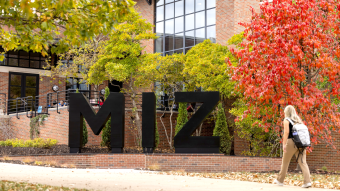Feb. 4, 2022
Transcript
Brian Consiglio: While the omicron variant of COVID-19 continues to infect people around the world, researchers at the University of Missouri have identified the specific mutations that are causing the omicron variant’s high rate of infection.
Kamlendra Singh, a principal investigator in MU’s Bond Life Sciences Center, teamed up with undergraduate student Austin Spratt, and Saathvik Kannan, a student at Hickman High School in Columbia, to analyze protein sequences of omicron samples from around the world. Kannan said the new variant and its distinct mutations show how the virus has evolved over time.
Kannan: “The omicron variant has significantly more mutations in the spike protein, which is the target of most vaccines, than any other variant.”
Consiglio: The findings help explain how the new variant can escape pre-existing antibodies present in the human body, either from vaccination or naturally from a recent COVID-19 infection.
Kannan: “The antibodies are able to sense it to some extent, but it is still different compared to the original virus, and that is why antibodies are less able to recognize it. Our overall objective is to find out as much as we can about these variants. The more we know, the more we are likely to make decisions based on it.”
Consiglio: For more on this research, visit showme.missouri.edu.
I’m Brian Consiglio, with a Spotlight on Mizzou.



